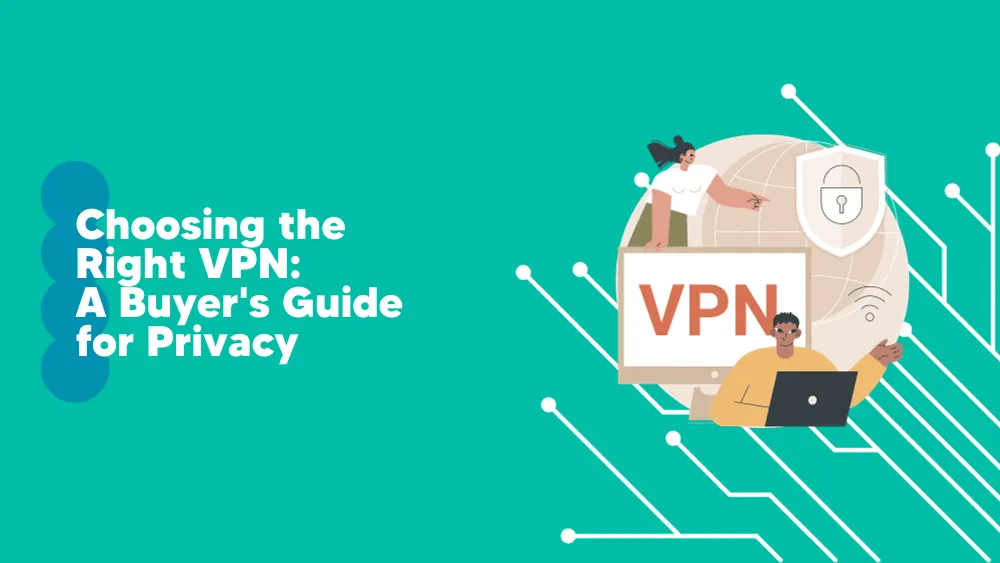Surfshark and ExpressVPN are both top-rated VPNs with strong security and streaming support, but they cater to different needs.
Surfshark lets you connect as many devices as you want and has some pretty good long-term pricing, making it perfect for big families or anyone looking to save a bit. On the other hand, ExpressVPN offers super-fast speeds and top-notch reliability, which makes it great for streaming in 4K and gaming.
We’re here to help you figure out which VPN service is better for you: Surfshark or ExpressVPN.
Why are VPNs important?
With all the data tracking and big security breaches happening these days, VPNs (Virtual Private Networks) have turned into must-have tools for staying private and secure online.
They work by encrypting your internet traffic and hiding your IP address, which helps keep your sensitive info safe from hackers and nosy people.
In fact, studies show VPN usage has exploded worldwide – 1.75 billion people now use VPNs globally, including 42% of Americans, and 93% of organizations rely on VPNs for secure connections.
Surfshark and ExpressVPN consistently rank among the best VPNs. Both providers support a wide range of devices and offer easy-to-use apps.
However, they have different strengths (as we’ll explore), so the “best” choice depends on your specific needs. Below, we break down the key differences in security, speed, and streaming support.
Overview: Surfshark vs ExpressVPN
Before diving into the details of their features, let’s take a quick look at their products:
What is Surfshark?
Launched in 2018 and based in the Netherlands, Surfshark is a relative newcomer that has quickly gained popularity. It boasts 3,200+ servers across 100+ countries. Surfshark’s standout features include MultiHop (double-VPN tunneling) and its CleanWeb ad/tracker blocker.

Uniquely, Surfshark allows unlimited simultaneous device connections on a single plan, making it great for large households or offices. Reviews highlight its affordable pricing and ease of use.
- Secure all your devices simultaneously
- Very low cost, especially on multi-year plans
- Offers multi-hop VPN, CleanWeb ad-blocker, and data breach alerts.
- Fast on most servers (see speeds above)
- 30-day refund (after 7-day trial)
- Variable speeds
- No dedicated app for game consoles or Apple TV.
- Streaming Hit-or-Miss: Generally good, but as one review notes, Netflix and others occasionally block some Surfshark servers.
What is ExpressVPN?
Founded in 2009, ExpressVPN is a veteran known for rock-solid performance. It now runs over 3,000 RAM-only servers in 105 countries, offering extremely broad global coverage. ExpressVPN provides proprietary protocols (Lightway) plus OpenVPN and IKEv2.

Its apps are minimalist and user-friendly, and it includes a strong no-logs policy and kill switch. Users often praise ExpressVPN’s consistently blazing-fast speeds, though this premium service comes with a higher price tag.
- Among the fastest VPNs out there, excels at streaming and large downloads
- Servers in 105 countries
- 99.9% uptime network (per ExpressVPN) and consistent performance
- Supports laptops, phones, routers, smart TVs, consoles (via router), and even has its own hardware (Aircove) with VPN built in.
- Excellent Support: 24/7 live chat and extensive documentation.
- Higher monthly cost than most competitors
- Only 5–8 devices can connect at once
- Must subscribe first, then request a refund if dissatisfied.
- Lacks multi-hop or built-in ad-blocking – it focuses on core VPN functions.
Surfshark vs ExpressVPN – features comparison
In the sections below, we’ll compare each area in detail to help you decide which VPN fits your use case.
Security & Privacy
Both Surfshark and ExpressVPN focus heavily on privacy and use the strongest encryption available:
-
Encryption
Both VPNs use AES-256 encryption (the “gold standard” used by militaries and banks) to secure data. ExpressVPN’s apps use AES-256 with OpenVPN/Lightway, along with 4096-bit RSA keys and SHA-512 authentication. Surfshark similarly offers AES-256 in its OpenVPN, IKEv2, and WireGuard modes.
-
Protocols
Surfshark supports OpenVPN, IKEv2, and WireGuard (a modern protocol known for high speed and performance). ExpressVPN supports OpenVPN, IKEv2, L2TP/IPSec (legacy), and its custom Lightway protocol. Lightway is designed for quick reconnections and reliability.
In practice, both VPNs maintain strong security whether you’re on mobile or desktop.
-
No-Logs Policy
Both companies enforce strict no-logs policies. Surfshark states it does not collect user activity or connection logs. ExpressVPN is headquartered in the privacy-friendly British Virgin Islands and has been independently audited to verify its no-logging claims.
Neither provider retains browsing histories or IP data.
-
Kill Switch & Leak Protection
Each VPN offers an integrated kill switch that automatically blocks internet traffic if the VPN drops. They also provide DNS and IP leak protection to prevent any accidental exposure of your data. These features ensure that your real identity stays hidden even in the rare case of a VPN failure.

Takeaway
Both Surfshark and ExpressVPN are highly secure choices. Surfshark offers robust privacy and security features, including AES-256 encryption, a kill switch, DNS leak protection, and a no-logs policy. Similarly, ExpressVPN uses industry-leading encryption protocols and does not log user activity.
Speed & Performance
Speed is often a decisive factor. In general, ExpressVPN tends to lead in raw speed tests, while Surfshark keeps up impressively well:
ExpressVPN
Many reviews report that ExpressVPN “maintains fast speeds even when connected to servers in distant locations. In fact, independent testing has found ExpressVPN “dominates” on speed, especially for US/UK connections.
This means less buffering for 4K streaming or lag for gaming. ExpressVPN uses optimized servers and its Lightway protocol to minimize latency and dropouts.
Surfshark
Surfshark also delivers strong performance; it is praised for maintaining fast and reliable speeds across its network. In throughput tests, Surfshark often shows very high download rates, particularly when using WireGuard.
In one head-to-head torrent test, Surfshark finished a large 5.7 GB download in half the time of ExpressVPN (2 minutes vs 4 minutes). Users do report some variation: a few servers (often in remote regions) can be slower or flaky, but overall Surfshark gives very smooth performance for streaming and downloading.
Key Insight
If absolute speed is your top priority (e.g. large file transfers or 4K streaming), ExpressVPN often has a slight edge. If you need plenty of bandwidth on many devices, Surfshark’s speeds are still excellent and have minimal impact. In practice, both work very well, and differences may be subtle in daily use.
Streaming, torrenting & content access
Both VPNs shine at bypassing geo-blocks and support popular streaming and P2P uses:
-
Streaming
Surfshark and ExpressVPN both unblock Netflix, Disney+, Amazon Prime, BBC iPlayer, Hulu, HBO Max, and more. Both offer Smart DNS features (Surfshark’s SmartPlay and ExpressVPN’s MediaStreamer) for devices that can’t run apps (like some smart TVs).
Yet, neither VPN has real weak spots here; users report reliable access to US Netflix and global libraries with either service. In short, expect both to handle your favorite shows and live sports without trouble.
-
Torrenting/P2P
Surfshark and ExpressVPN support P2P on most servers. Neither has features like SOCKS5 proxies, but both allow torrenting. In speed tests, both did well – Surfshark’s WireGuard gave it a download speed advantage in one test.
The takeaway is that both VPNs will provide secure, fast torrenting. (Note: If P2P is your main use, some users prefer NordVPN or others with dedicated torrent servers, but Surfshark and ExpressVPN are still very competent.)
-
Special Features
Surfshark includes MultiHop (double-hop VPN), which routes traffic through two servers for extra privacy. ExpressVPN does not offer multi-hop but uses RAM-only servers (TrustedServer tech) to ensure all data is wiped on reboot.

Both have features to avoid DPI censorship (ExpressVPN’s Lightway and obfuscated servers; Surfshark’s Camouflage mode), though in highly restrictive regions like China, ExpressVPN is generally more reliable.
Overall, on content access, they are neck-and-neck.
Server network & global reach
A larger server network means more locations and less congestion:
Surfshark’s network is marginally larger, while ExpressVPN’s is more geographically diverse. Both let you choose from 90–105 country options (enough for virtually all content needs).
So Surfshark has the edge on sheer count, but ExpressVPN covers more countries and tends to have more servers in high-demand regions (US, Europe).
Devices & platform support
Whatever device ecosystem you use, both VPNs cover the essentials:
-
Surfshark
Native apps for Windows, Mac, Linux, iOS, Android, as well as browser extensions (Chrome, Firefox, Edge), Amazon Fire TV, and more. It also supports certain routers and NAS devices. However, Surfshark does not have apps for Apple TV, game consoles, or some older Smart TVs.

Crucially, Surfshark lets you connect an unlimited number of devices at once on one account (even after the free trial ends). This is a major advantage for tech-heavy homes or businesses.
-
ExpressVPN
Apps for Windows, macOS, Linux, iOS, Android, routers, and media devices (Apple TV, Fire TV, Kodi, etc.). It even offers firmware for its own Aircove router. ExpressVPN supports about 8 simultaneous connections (some sources say 5, some 8, depending on plan).
So if you have more than 8 devices (like phones, laptops, smart TVs, consoles), you’ll need to choose carefully which ones are connected.
Who wins on devices?
Surfshark’s device list is slightly shorter, but its unlimited connections policy is compelling. ExpressVPN’s wider app support (including Apple TV, consoles, and browser extensions) is a plus, but its connection cap (5–8) is a limitation for large families or offices. The choice depends on your priorities: more flexibility vs. more devices.
Surfshark vs ExpressVPN – pricing & value
Surfshark is generally more budget-friendly, especially on longer plans:
Monthly plans start around €9.99 (Surfshark Starter) (pricing may vary by currency), but discounts apply for longer subscriptions.
For example, a 2-year plan can cost as little as €1.99/month, and you get an extra 3 months.. All Surfshark plans (Starter, One, One+) include unlimited devices. The Surfshark One tier adds security extras (antivirus, search, etc) for a bit more.
Surfshark offers a 7-day free trial on mobile platforms and a 30-day money-back guarantee for all purchases.
Get 87% OFF Surfshark VPN!
The Monthly price is higher (around $12.95 per month). It’s a 12-month plan that averages about $6.67/month (billed as ~$99.95/year), and the 2-year plan is about $5.35/month (billed ~$149.70 for 24 months).
All plans include the same features (there is no “free trial”, but you have a 30-day refund window). Note that ExpressVPN’s pricing is quoted in dollars; European customers may see equivalent euro pricing.
Surfshark is significantly cheaper long-term, partly because of deep multi-year discounts. ExpressVPN is more expensive, but it maintains the same 30-day return policy for any plan.
Try ExpressVPN risk-free for 30 days!
Surfshark vs ExpressVPN
The best choice depends on your priorities:
Choose Surfshark if:
You want to cover a large number of devices or have a tight budget. Surfshark’s unlimited-device policy is revolutionary for families or small businesses with many gadgets.
It also offers a lot of features (multi-hop, ad-block, breach alerts) for the price. If cost-effectiveness is key and you still want strong security, Surfshark is the practical daily driver. As one user summary noted, Surfshark delivers “value for money” with unlimited coverage, even if its speeds can fluctuate somewhat.
Choose ExpressVPN if:
You need the absolute fastest and most stable connections under all conditions (e.g., for HD/4K streaming, gaming, or use in high-censorship regions). ExpressVPN’s premium infrastructure and Lightway protocol are engineered for speed and reliability.
It’s also a strong pick if you want a VPN that “just works” on any device or router without juggling settings. In short, ExpressVPN is like a high-performance luxury car: fast, secure, and rock-solid, but you pay more for that quality.
Sometimes the best way is to try both risk-free: Surfshark offers a 7-day trial (mobile) and a 30-day refund; ExpressVPN offers a 30-day money-back guarantee.
Ultimately, both providers are highly reputable, so you’ll get strong privacy either way – it’s a question of whether you value speed (ExpressVPN) or device count/price (Surfshark) more.








